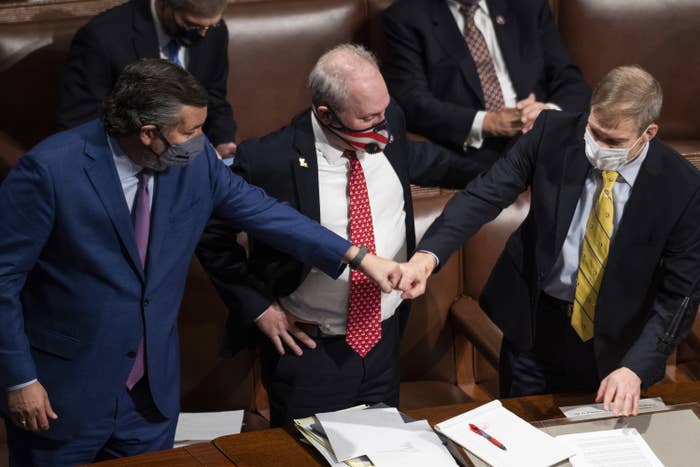
Facebook is resuming contributions through its political action committee but will not give money to any members of Congress who voted against certifying the 2020 US election, the company notified employees on Thursday.
In an internal announcement, Brian Rice, a public policy director at Facebook, said that the decision came after the Jan. 6 insurrection and a review of the company’s contribution policies. Five days after the storming of the Capitol, Facebook said it would pause all political donations for at least three months.
“As a result of our review, the FBPAC Board has decided to resume contributions, but not to any members of Congress who voted against certifying the 2020 election following the events at the Capitol on January 6,” Rice said in an internal note obtained by BuzzFeed News. “While a contribution to a candidate for office does not mean that we agree with every policy or position that a candidate may espouse, we believe this decision is appropriate given the unprecedented events in January.”
Facebook’s decision means the company will not make political contributions to eight US senators — including Ted Cruz from Texas and Josh Hawley from Missouri — and 139 members of the House of Representatives who challenged state election results from either Arizona or Pennsylvania. All 147 lawmakers who voted against the certification are Republican; some, like Cruz and Hawley, have already been vocal opponents of Facebook.
The move comes as a politically precarious time for the social network in its home country as it faces pressure from both Democrats and Republicans over a litany of issues, ranging from its handling of misinformation to the perceived censorship of conservative voices. Facebook is also currently facing antitrust lawsuits from attorneys general of 46 states and two territories as well as the Federal Trade Commission.
“After our last announcement, some of you asked — why do we have a PAC at all?” Rice wrote. “Ultimately, public policy decisions can have significant implications for our business, our employees, and the people who use our products and services. We administer a PAC to allow eligible employees to voluntarily pool their money to support federal candidates who share Facebook’s business mission.”
During the 2020 election cycle, the Facebook PAC donated a total of $36,500 across the campaigns of 13 Republicans who later voted against certifying the election, according to OpenSecrets data. Among that group, the PAC gave the most — an $8,000 contribution —to Rep. Steve Scalise, a member of Republican leadership who voted against certifying election results in both Arizona and Pennsylvania.
Facebook also gave $5,000 to House Minority Leader Kevin McCarthy, who also voted against certifying results from Arizona and Pennsylvania.
Facebook spokesperson Andy Stone confirmed the company’s decision outlined in the internal post, but declined to provide specifics.
It is currently unclear if the PAC will contribute to Republican congressional committees, which could in turn steer money to politicians who voted against election certification. Facebook’s PAC has given $30,000 each to the Republicans’ Senate and House campaign committees since 2019.
In April, Cruz announced he’d no longer accept money from corporate PACs, calling CEOs “fair-weather friends to the Republican Party.” He had not received any donations from Facebook since at least 2013, according to the company’s self-reported data.
Of the eight senators who voted against certifying the election, the only two to receive donations from Facebook’s PAC since 2013, were Cindy Hyde-Smith of Mississippi and John Kennedy of Louisiana. Hyde-Smith received $2,500 in 2018, while Kennedy received a $1,000 contribution that same year.

